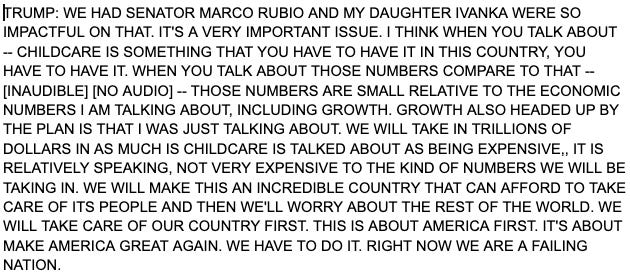Hello sanewashing, goodbye journalism.
How one word popularized by journalist Aaron Rupar helps refocus attention on the destructive media practice of polishing Trump's gibberish.
Political journalists seem to be working overtime to pick through Donald Trump’s word salads to find something, anything that makes him sound like a normal politician. Finding a quote for a story or summarizing an event is a regular part of news reporting. Ignoring mistakes, polishing gibberish, confusing talking points for facts, sanding down vulgarities and inventing false equivalence is something altogether different.
It’s all a game for Trump. One that he is clearly winning as more news outlets become willing to play the Trump version of bananagrams with words and ideas scattered everywhere but none of it making sense until journalists swoop in. They literally pick up the pieces from Trump's rants and get to work stringing his sentences together to help minimize just how incoherent and vulgar he truly is.
Journalist Aaron Rupar has smartly named this amped up media manipulation ‘sanewashing.’ That phrase has caught on and is helping refocus attention on this troubling media practice. I asked Rupar how he landed on sanewashing. He says:
“I started using the term regularly this summer in response to the regular phenomenon of cable news networks and other big outlets sanitizing Trump's reliably bonkers speeches, news conferences, and press events. Instead of taking him live, they've gotten into the habit of having correspondents summarize what he says after the fact, and these summaries often give a false impression that Trump is coherent and conducts himself like a normal politician.”
Rupar calls out the News York Times and CNN as two of the worst offenders. He adds:
“I can't speak to motivations, but I think sane-washing is a product of media outlets still wanting to cover Trump through a "both sides" prism. They don't want to take sides, and the result is a flood of false equivalencies and the presentation of a manifestly unfit criminal as a reasonable choice for voters.
I would encourage people to the extent possible to watch Trump for themselves -- or at least clips of him -- and understand that when correspondents are summarizing him for you, they're often not giving you the complete picture of his unhingedness.”
One of the clips you need to see for yourself is Trump at the New York Economic Club on Thursday where "he didn’t utter a single coherent sentence,” according to MSNBC’s Stephanie Ruhl. The Washington Post’s Catherine Rampell said “My job is to analyze policy. I can't even find a complete sentence in this. Investor Mark Cuban agreed: “The man talks #gibberish and the MSM ALWAYS covers for him. Every article about the questions so far has made it sound like they were direct responses. They were #gibberish. The (media) should call it what it is.”
Yet here’s Politico’s sanewashing: “Trump laid out a sweeping economic vision of lower taxes, higher tariffs and light-touch regulation in a speech to top Wall Street execs today.”
Ummm. No.
Photo credit: David Dee Delgado / AFP / Getty
But the award for this week’s most egregious sanewashing came from the Q & A when Trump was asked about making child care more affordable. The response was a sputtering assortment of words without single cogent thought about child care. It was such a bizarre answer that in a normal political environment, questions about Trump’s mental fitness would lead every newscast for days. But that’s not what happened. Instead, he got a glow-up from the New York Times and other news organizations.
Just watch the clip, read the transcript and see if you think the New York Times version accurately describes it. Here’s transcript and the New York Times’ initial take:
Here’s Times reporter’s Michael Gold’s quick take:
Media Critic Mark Jacob’s reacted to the Times coverage with this: “The sane-washing of Trump in the New York Times is approaching Fox News status, which means the more you consume it, the less you know.”
Some critics think the normalization is intentional, including former Times reporter Bill Carter: “I’m past the point of understanding why coverage of the most abnormal candidate in US history is so bent on normalization. But there’s no argument anymore. They’re doing it. Even though I’m sure they recognize disaster will befall their country if he’s elected. Why utterly baffles me.”
There are serious consequences to this sanewashing practice. Not only does it erode the practice of journalism, it’s also a threat to our democracy as Parker Molloy wrote:
This “sanewashing” of Trump’s statements isn’t just poor journalism; it’s a form of misinformation that poses a threat to democracy. By continually reframing Trump’s incoherent and often dangerous rhetoric as conventional political discourse, major news outlets are failing in their duty to inform the public and are instead providing cover for increasingly erratic behavior from a former—and potentially future—president.
The consequences of this journalistic malpractice extend far beyond misleading headlines. By laundering Trump’s words in this fashion, the media is actively participating in the erosion of our shared reality. When major news outlets consistently present a polished version of Trump’s statements, they create an alternate narrative that exists alongside the unfiltered truth available on social media and in unedited footage.”
Bringing ‘sanewashing’ into the media lexicon helps refocus attention on some very destructive journalism practices. Will it change anything? For news consumers, it could be helpful to have a new way to think about political coverage and maybe even encourage some digging to watch & read Trump’s actual comments. But the press itself will likely continue on this destructive path heralding bumbling word salad as a sweeping vision while ignoring serious questions of Trump’s mental fitness.
Jennifer Schulze is a Chicago journalist talking about journalism. You can read her columns here and at Heartland Signal. Follow Jennifer on Threads @newsjennifer_schulze or Twitter/X @NewsJennifer.




